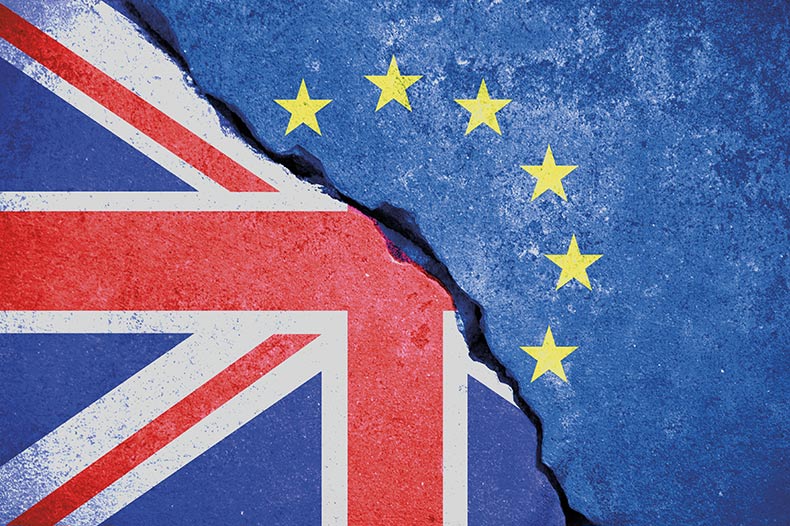CITMA in action: At your service
This time last year, the UK IPO wasn’t considering the issue of UK address for service rules post-Brexit. Here’s how we helped it to see things differently.

As we move into a post-Brexit 2021, only a UK, Gibraltar or Channel Islands address will be allowed on new proceedings before the UK IPO. The enaction of legislation to bring this about was, as CITMA President Richard Goddard says, a positive change that will “help to protect the UK’s world-leading intellectual property environment, those who work within it and the businesses who rely on the expertise of UK IP legal professionals”.
He also notes that “it is in the interests of IP owners with UK rights to have a qualified professional who is familiar with UK law and practice advising them”. Yet, as late as November 2020, this outcome was not a foregone conclusion – and CITMA was hard at work to get it over the finish line.
Ever since the EU referendum result was announced in June 2016, we have taken a lead on developing options and solutions for the future of IP in the UK. By June 2017, we were meeting with the European Commission and members of the EU’s Brexit negotiation team to brief officials on a raft of issues, including rights of representation, exhaustion of rights, enforcement and goods in transit. By July 2017, we had published our official position paper on rights of representation and registered rights. It provided a clear steer to the UK Government and other stakeholders as to what the trade mark legal profession was calling for.
Dedicated campaign
In April 2020, we began a dedicated campaign to ensure that the UK Government was alive to the issue of representation and address for service (AfS). This involved a two-pronged strategy aimed at directly influencing the IP Minister through parliamentary channels and indirectly through media, member and ally engagement.
On the parliamentary side, we prepared briefings for a range of MPs and peers and compiled a list of key influencers. Parliamentary questions were suggested and sent to key figures, and ministerial letters were sent to the Department for Business, Energy and Industrial Strategy, the Treasury, the Ministry of Justice, the Department for Digital, Culture, Media and Sport, the Department for International Development and No. 10 itself. The issue was also raised with the All-Party Parliamentary Group for Intellectual Property (IP APPG).
Continued contact was made with the Brexit Select Committee, including submissions to the Lords’ EU Services Sub-Committee and the Committee on the Future Relationship with the EU, keeping all members up to date and under pressure.
Following this engagement, Lord Smith of Finsbury, Lord Clement-Jones (Treasurer, IP APPG) and Baroness Neville-Rolfe (a former Minister and a member of IP APPG) submitted written parliamentary questions on the issues of UK AfS and rights of representation for UK professionals before the EUIPO.
The UK IPO confirmed that it would publish a consultation on the AfS issue. Having responded to the consultation ourselves, we then set about encouraging allies and members to do the same by hosting information sessions and preparing template letters.
Overwhelming support
In November, the UK IPO’s Chief Executive Tim Moss told our Autumn Conference that the IPO was treating the issue of AfS as “a top priority”. Shortly after that, the Government reported on its proposed change to AfS, which received overwhelming support in a “call for views”. Ninety-two per cent of respondents were in favour of the change, and the same number said that it would have a positive effect on their business.
In total, the call for views was answered by 1,068 people. Of these, 97 per cent had offices in the UK, 38 per cent were based in the EU or EEA, and 11 per cent were located elsewhere in the world. Asked which areas of IP they operated in (multiple answers were allowed), 96 per cent said they worked in trade marks, 93 per cent said registered designs, 85 per cent said patents, and 83 per cent said unregistered designs.
Ultimately, of course, the Government announced that the change would be made, and the legal means to amend the UK IPO’s AfS rules was laid in Parliament.
The statutory instrument tabled by IP Minister Amanda Solloway removed reference to the EEA and meant that only a UK, Gibraltar or Channel Islands address would be allowed on new proceedings before the UK IPO after 1st January 2021. (Previously, a correspondence address within any of the other 30 countries of the EEA could be used in proceedings.)
New trade mark, design and patent applications and oppositions will need a UK address, but the same will not be required for the renewal of existing registered or granted rights. The new rules will include transitional provisions for ongoing cases. The more than two million EU trade mark and registered Community design rights that will be recreated on the UK register will not need a UK address for three years following the end of the transition period.
It was a long campaign, and we join Tim Moss in welcoming the legislation as we all settle in to see what effects Brexit will have on our profession. Whatever is in store for us all, the changes – as Moss said – “will help to establish more of a level playing field for the UK, reflecting our new status as an independent nation”.
Making our point in the media
Our campaign included engagement with the IP and mainstream press to gain as much coverage of the issue as possible. In particular, CITMA President Richard Goddard contributed a lengthy opinion piece to City A.M. in June, in which he contended that the Government’s concept of “taking back control” would not be reflected in the practical effect of Brexit on representation rights unless steps were taken. Goddard also appeared in IP Magazine, Managing IP and World IP Review.
Read more from CITMA Review
